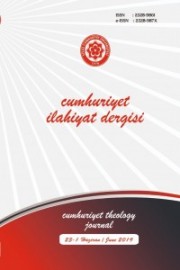Sahabe Şiirlerinde Medine’ye Hicret
The Migration to Medina in Ṣaḥāba’s Poetry
Author(s): Mehmet YılmazSubject(s): Studies of Literature, Islam studies, Migration Studies
Published by: Cumhuriyet Üniversitesi İlahyat Fakültesi
Keywords: Arabic Language and Rhetoric; Poem; Companion; Migration; Pagan; Verse;
Summary/Abstract: After receiving the divine authorization from Allah to openly notify people of Islam, the Messenger of Allah started to publicly to invite the people of Mecca to Islam. Idolaters however felt heavy shame to give up the faith of their ancestors, and the pagans did not accept the Prophet's invitation to Islam. They applied various pressures to the Messenger of Allah and the believers to renounce the cause of Islam. When the animosity against the new Muslims became intolerable, Almighty Allah gave permission to immigrate, first to Habasha and then to Medina. Some of the companions of the Prophet periodically immigrated to Habasha and then to Medina. In the sources that have survived to the present day, poets (ṣaḥāba: companion of the Prophet Muhammad peace be upon him) reflect the events experienced during the immigration to Medina and the intensity of emotions they felt during the holy journey. These poets demonstrate in their writings a sense of elation and pride, having followed the Prophet's favorable advice to immigrate to Medina and portend that their religion will be strengthened in Medina by their presence. Their poems in terms of style are more focused on unscripted, or spontaneous feelings, a style of pauses to give harmony between the shorter verses, unlike long poetic tradition in the period of ignorance (Jāhiliyya).
Journal: Cumhuriyet İlahiyat Dergisi
- Issue Year: 23/2019
- Issue No: 1
- Page Range: 149-170
- Page Count: 22
- Language: Turkish

